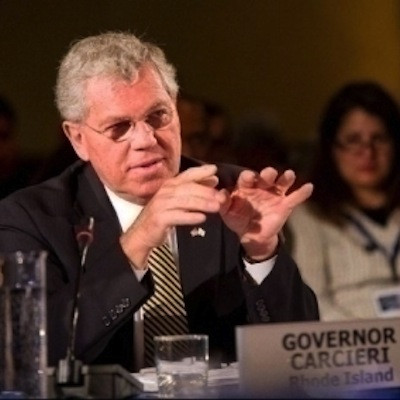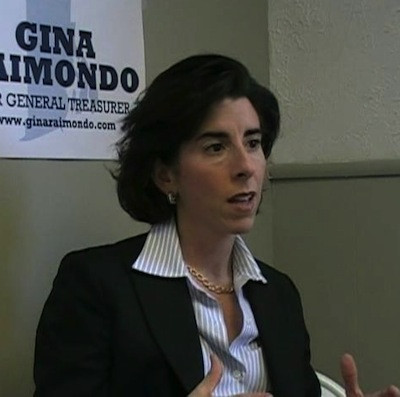Could Rhode Island Cities Face a Detroit-like Bankruptcy?
Tuesday, December 10, 2013
Detroit was recently given the go-ahead to continue with bankruptcy proceedings, making it the largest US city to do so. Could it happen in RI?
"It's a real concern -- Detroit isn't Central Falls," said Paul Doughty, head of the Providence firefighters union. "You could argue you can't let anything happen to Detroit, it's too big. But they just did."
URI Distinguished Professor of Business Edward Mazze warned as well that the Motor City's current situation was far from unique. "Detroit's bankruptcy reopens the issue nationally on the protection of municipal worker's pension and health benefits when a city or town has serious financial problems. The Detroit bankruptcy shows that no city, no matter how big or small, can fail and go into bankruptcy if there is poor leadership, little fiscal responsibility, namely, more spending than revenue, and little attention to a focused economic development strategy," said Mazze.
GET THE LATEST BREAKING NEWS HERE -- SIGN UP FOR GOLOCAL FREE DAILY EBLASTThis past weekend, Providence Mayoral Candidate Brett Smiley's appearance on Channel 12's Newsmakers had Smiley acknowedging that the city's financial situation, while improved, was far from out of the woods. “If we muddle along or accept the status quo, I do think it’s possible that five years from now we could be back talking about bankruptcy," said Smiley.
Detroit Puts Pensions on the Table
U.S. Bankruptcy Judge Steven Rhodes ruled last week that despite protections in Michigan's constitution, municipal employee pension contracts there can be compromised -- and cut -- in federal bankruptcy court under Chapter 9 restructuring. While Providence finalized an agreement this past spring with the city's retiree association, police, and firefighters to address the city's unfunded pension liability, legal challenges to both the city -- and state's -- recent pension reforms present an issue still as both municipalities and the state continue to address fiscal obligations.
"In Rhode Island, if the current court recommended negotiations on state pension givebacks including cost of living adjustments results in significant changes to the earlier agreement, and if local cities and towns get no relief in their unfunded pension and health benefits liabilities from state sources, a Chapter 9 bankruptcy filing is an option," said Mazze. "While some Rhode Island cities and town's financial situations are better than a year ago, other cities and towns are struggling to balance their budgets."
Mazze continued, "A Chapter 9 bankruptcy filing has long-term reputation, economic development, taxing, bond rating and local sovereignty implications. Using bankruptcy is an example of poor leadership. Can Chapter 9 bankruptcies happen in the foreseeable future in Rhode Island? Yes, if we continue to have individuals in office with no vision, realistic solutions to problems, no economic plan and suffer no consequences for political promises that make little economic sense."
Lawyer Joe Penza with Olenn and Penza, LLP, who had been involved in Providence's landmark pension reform, thought however that with the recent Detroit examples, more municipalities would view bankruptcy as being a viable turnaround option on the table.
"I think you'll see more and more Chapter 9s filed because it's a fresh beginning, they're stronger out of bankruptcy," said Penza. "The Detroit case now brought to light the very real thing that could have happened here in Providence. Who would have thought Detroit could go bankrupt?"
Nationwide, there have been 38 municipal bankruptcy filings nationwide since 2010, according to Governing.com -- and the "majority of filings have not been submitted by bankrupt cities, but rather lesser-known utility authorities and other narrowly-defined special districts throughout the country," bringing the total of general purpose local government bankruptcy filings to 8 (including Central Falls and Detroit). Three of those however, have been dismissed.
Bankruptcy Changing the Equation?
Both Penza and Doughty said the prospect of bankruptcy -- and uncertainties surrounding what could have happened if filed -- played a major role during the negotiation of the pension agreement in Providence, which is currently facing a lawsuit from at 66 fire and police retirees
"Prior to Central Falls filing for bankruptcy, retirees there asked to meet with me, because these guys were concerned with what they were hearing. There were rumors their pensions were cut in half," said Penza. "I said look, there's no way that the state will let Central Falls go into bankruptcy. And then we saw what happened."
Penza, however, thought that the bankruptcy served to benefit Central Falls. "I think that decision ultimately helped Central Falls, and had an impact on beneficiaries," said Penza. "It was also an awakening though that it could happen in the case of Providence -- I certainly thought about the impact."
Doughty said that it was precisely impact of a potential bankruptcy that concerned him during negotiations with the city -- and that the recent Detroit decision, which could drastically impact municipal employee pensions there, justified the course of action.
The City of Providence agreement with retirees, fire, and police, which capped all pensions at either 150 percent the state median income or less than the salary of the current employee in the position -- and cut COLAs for ten years -- according to the City saved Providence $18.5 million in FY13 and reduces the City's unfunded pension liability by about $170 million.
"This redeems the position that leadership took -- we didn't know what could happen, so we took hold of our own future," said Doughty. "Some people who opposed it thought bankruptcy couldn't have happened, and we know now it can. I worry because this problem is so wide-spread, and local judges decide it -- it's going to require that they say that yes, pensions can be touched."
Doughty thinks that the changes made through the agreement will help keep the city viable -- and out of any potential bankruptcy scare now, "save for a catastrophic national downturn." However, Doughty saw other Rhode Island municipalities as facing uncertain futures.
"Both Woonsocket and West Warwick are going to have significant trouble over the next year," he said. "If bankruptcy could happen in Detroit, it could happen anywhere."
Taking on OPEBs, Pensions
Cumberland Mayor Dan McKee spoke with GoLocal about efforts the city was undertaking to work to address its pension obligations, after being granted "critical status" by the state for the town's funding levels.
"The way I looked at it, was we needed to get "x+y" to get to "z" -- meaning the OPEB ARC (annual retired contribution), and pension ARC -- had to get to Z, meaning where it needs to be," said McKee, acknowledging that the town needed to address its "other post-employment benefit" obligations in addition to municipal pensions.
"So it didn't matter to me how to get to Z. In order to keep that equation balanced, if the police wanted something on the pension side, it had to be addressed on the OPEB side, again to get to Z. It was a true negotiation, and we see a path to be successful," he continued.
McKee addressed that the negotiations were "protracted" as the town worked with police. "My thought was to keep the promises made, and reset going forward with the [Cumberland] Police Department, to their credit. They did vote in 26-12 to approve the conditions. You have those pushing back, but it's a strong level of support," noting that the Cumberland Town Council was voting on the proposed changes on Monday.
"On the health insurance, which is two-thirds of the issue we're dealing with in terms of exposure -- we aligned a HSA with a $2K/$4K deductible, which is consistent with what we previously set for fire and municipal workers," said McKee. "We'll reimburse 50% of the deductible for current [police], new officers will be responsible for the 100%."
Among the changes proposed, McKee noted, "The new hires will need to have 25 years of service -- as opposed to 20, and can begin to collect pension at 50. We'll do a career average, as opposed to the current look at just the last years, and there's an increase in their contribution as well."
The changes would make the OPEB -- and pension - ARCS then sustainable for the town, said McKee. "We start at a $2M ARC on pensions, could grow to $3M, and then we'll see a decrease. Similarly, the ARC on health care is $1.5 M then up to $2.5M, and then it drops considerably as well."
Overall, McKee said he thought it was a "give and take" between the negotiating team for the police department. "I've said all along that it's manageable, we're not impacting our retired officers, we're pretty much providing what was agreed," said McKee, who acknowledged that for future hires, "It's a strong reset for new guys."
Related Slideshow: Timeline - Rhode Island Pension Reform
GoLocalProv breaks down the sequence of events that have played out during Rhode Island's State Employee Pension Fund reform.
Related Articles
- Central Falls Bankruptcy - City Reacts
- Central Falls Mayor—Don’t Blame Me for Bankruptcy
- Expert Says Municipalities Should Stop Threatening Bankruptcy
- Ten Ways to Save Providence from Bankruptcy
- Chafee—Central Falls Bankruptcy a ‘Positive’ for Economic Development
- 38 Studios Bankruptcy Hearing Begins Today: Company Owes $150 Million
- LEGAL MATTERS: Think Twice Before Filing Bankruptcy
- The Scoop: Raimondo Tops Taveras by 250K, Brown Bankruptcy Forum
- Could Rhode Island Cities Face a Detroit-like Bankruptcy?
- 38 Studios Bankruptcy: Executives Say Tax Credits Could have Saved Company
- Municipal Bankruptcy: Who’s Next In RI?
- Will Central Falls Bankruptcy Damage RI’s Brand?
- A LIVELY EXPERIMENT Central Falls Bankruptcy
- NEW: 38 Studios Bankruptcy Case Moving to RI
- NEW: RIPEC Report Finds Bankruptcy Might Not Solve Cash-Strapped Cities’ Problems
- A LIVELY EXPERIMENT Central Falls Bankruptcy Pt. 2
- NEW: Central Falls Bankruptcy—General Assembly Leaders Speak Out
- NEW: Rating Agency Reacts to Central Falls Bankruptcy
- BREAKING NEWS: Central Falls Files for Bankruptcy
- NEW: Central Falls to Emerge from Bankruptcy
- NEW: Receiver—Decision on Central Falls Bankruptcy Weeks Away
- Can Woonsocket be Spared from Bankruptcy?
- PODCAST: Rhode to Bankruptcy
- NEW: Twin River Rebuts Bankruptcy Judge










































